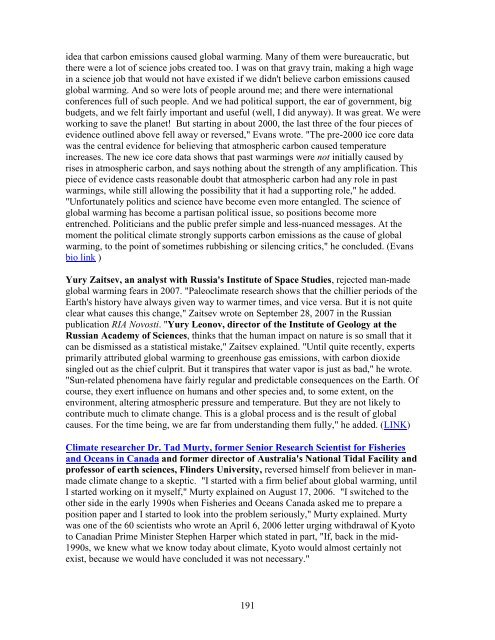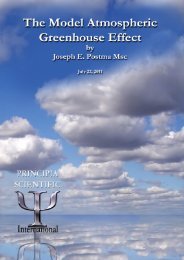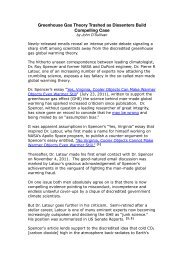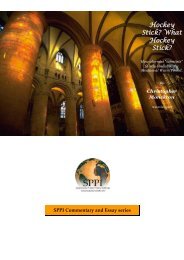Than 1000 International Scientists Dissent Over Man-Made Global ...
Than 1000 International Scientists Dissent Over Man-Made Global ...
Than 1000 International Scientists Dissent Over Man-Made Global ...
You also want an ePaper? Increase the reach of your titles
YUMPU automatically turns print PDFs into web optimized ePapers that Google loves.
idea that carbon emissions caused global warming. <strong>Man</strong>y of them were bureaucratic, but<br />
there were a lot of science jobs created too. I was on that gravy train, making a high wage<br />
in a science job that would not have existed if we didn't believe carbon emissions caused<br />
global warming. And so were lots of people around me; and there were international<br />
conferences full of such people. And we had political support, the ear of government, big<br />
budgets, and we felt fairly important and useful (well, I did anyway). It was great. We were<br />
working to save the planet! But starting in about 2000, the last three of the four pieces of<br />
evidence outlined above fell away or reversed," Evans wrote. "The pre-2000 ice core data<br />
was the central evidence for believing that atmospheric carbon caused temperature<br />
increases. The new ice core data shows that past warmings were not initially caused by<br />
rises in atmospheric carbon, and says nothing about the strength of any amplification. This<br />
piece of evidence casts reasonable doubt that atmospheric carbon had any role in past<br />
warmings, while still allowing the possibility that it had a supporting role," he added.<br />
"Unfortunately politics and science have become even more entangled. The science of<br />
global warming has become a partisan political issue, so positions become more<br />
entrenched. Politicians and the public prefer simple and less-nuanced messages. At the<br />
moment the political climate strongly supports carbon emissions as the cause of global<br />
warming, to the point of sometimes rubbishing or silencing critics," he concluded. (Evans<br />
bio link )<br />
Yury Zaitsev, an analyst with Russia's Institute of Space Studies, rejected man-made<br />
global warming fears in 2007. "Paleoclimate research shows that the chillier periods of the<br />
Earth's history have always given way to warmer times, and vice versa. But it is not quite<br />
clear what causes this change," Zaitsev wrote on September 28, 2007 in the Russian<br />
publication RIA Novosti. "Yury Leonov, director of the Institute of Geology at the<br />
Russian Academy of Sciences, thinks that the human impact on nature is so small that it<br />
can be dismissed as a statistical mistake," Zaitsev explained. "Until quite recently, experts<br />
primarily attributed global warming to greenhouse gas emissions, with carbon dioxide<br />
singled out as the chief culprit. But it transpires that water vapor is just as bad," he wrote.<br />
"Sun-related phenomena have fairly regular and predictable consequences on the Earth. Of<br />
course, they exert influence on humans and other species and, to some extent, on the<br />
environment, altering atmospheric pressure and temperature. But they are not likely to<br />
contribute much to climate change. This is a global process and is the result of global<br />
causes. For the time being, we are far from understanding them fully," he added. (LINK)<br />
Climate researcher Dr. Tad Murty, former Senior Research Scientist for Fisheries<br />
and Oceans in Canada and former director of Australia's National Tidal Facility and<br />
professor of earth sciences, Flinders University, reversed himself from believer in manmade<br />
climate change to a skeptic. "I started with a firm belief about global warming, until<br />
I started working on it myself," Murty explained on August 17, 2006. "I switched to the<br />
other side in the early 1990s when Fisheries and Oceans Canada asked me to prepare a<br />
position paper and I started to look into the problem seriously," Murty explained. Murty<br />
was one of the 60 scientists who wrote an April 6, 2006 letter urging withdrawal of Kyoto<br />
to Canadian Prime Minister Stephen Harper which stated in part, "If, back in the mid-<br />
1990s, we knew what we know today about climate, Kyoto would almost certainly not<br />
exist, because we would have concluded it was not necessary."<br />
191





